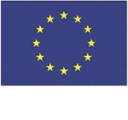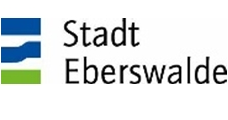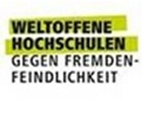Study abroad with Erasmus+ at one of our European partner universities
Study abroad with Erasmus+ at one of our European partner universities

Fotocredit: Oliver Reetz/DAAD
We are pleased that you are interested in an Erasmus+ study stay at one of our many partner universities in other European countries!
The following FAQ's are intended to give you an overview of the first steps, the general funding conditions, the application procedure at HNEE and further information on Erasmus funding.
If you have any further questions, please do not hesitate to contact us: outgoings@hnee.de.
***The cooperation contracts with the international institutional partners of HNEE are currently being renewed, therefore the overview of university partnerships is not up-to-date. Please get in contact with the International Office about possible destinations for an Erasmus+ semester abroad suitable for your specific study programme at HNEE.***
For a study visit, funded by Erasmus+, you should first of all select one of our partner universities.
This is an important prerequisite, as there must be an existing cooperation agreement.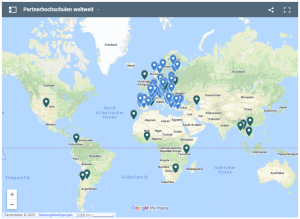 ‚Äč‚Äč‚Äč‚Äč‚Äč‚Äč‚Äč
‚Äč‚Äč‚Äč‚Äč‚Äč‚Äč‚Äč
Please pay attention to the following points while searching for a suitable partner university:
Overlapping of study contents: They are important in order to get credits for your studies abroad at your home university accepted.
Language of instruction: Acquire the necessary language skills as early as possible and certify them (e.g. by the language centre)
You can find the respective partner universities of your department here.
Students who wish to spend a semester abroad via Erasmus+ should be regularly enrolled at a German university. Citizens of non-EU countries should complete their entire studies at the German university and must be able to prove that they have completed one academic year before beginning their study abroad. Master students can be sponsored from the first semester onwards.
An ERASMUS+ cooperation between the home university and the university abroad must exist.
Students must provide the proof of a language certificate that complies with the requirements of the partner university
Regularly complete at least 23 ECTS at the partner university, which can be recognised as completed coursework for the degree at HNEE. Therefore, please select 30 ECTS in your Learning Agreement in order to be on the safe side in case of failed exams, course cancellations, etc. In justified cases, there may be exceptions regarding the minimum credits to be earned. However, it is essential that you contact the International Office for clarification and confirmation before your mobility in order to avoid possible repayments of Erasmus+ scholarships.
Students can be sponsored for up to 12 months in each study cycle (e.g. per Bachelor, Master, Doctorate). In addition, they can freely combine international student mobilities (study stay 3-12 months / internships abroad 2-12 months). A study period abroad must take at least 3 months and an internship abroad at least 2 months.
The ERASMUS+ scholarship offers a subsidy to cover the higher cost of living abroad. In addition to Erasmus+, students can apply for a grant for a stay abroad via BAföG. All important information on BAföG abroad can be found on the website of the Federal Ministry of Education and Research.
The financial mobility grant depends on the destination country. The grant is graded according to country groups and is based on the different cost of living in the respective target countries.
The current subsidies consist of the following rates:
Projekt KA 131 (2022)
Group 1 (600‚ā¨ per month): Denmark, Finland, Ireland, Iceland, Liechtenstein, Luxembourg, Norway, Sweden, Switzerland, United Kingdom
Group 2 (540‚ā¨ per month): Austria, Belgium, Cyprus, France, Germany, Greece, Italy, Malta, Netherlands, Portugal, Spain
Group 3 (490‚ā¨ per month): Bulgaria, Croatia, Czech Republic, Estonia, Hungary, Latvia, Lithuania, Poland, Romania, Serbia, Slovakia, Slovenia, Northern Macedonia, Turkey
Students with "fewer opportunities" as well as participants that are "travelling green" (please view columns below) have the possibility to apply for a subsidy to cover the additional costs arising from the stay abroad.
The decision as to which project the beneficiary will receive funding from is made exclusively by the HNEE International Office, depending, among other things, on the time and place at which the study visit takes place and on the availability of financial resources.
When are the application deadlines?
for the coming winter semester: January 31st
for the coming summer semester: 30 June
fully completed and signed application form with all attachments required in the application: Outgoings Registration Form
Please note that only applications that are received by the deadline will be considered. The application documents must be completed. The International Office will not request missing documents.
What happens with my application?
Application documents are checked by the International Office and eligible applicants are selected
A ranking is created by means of a points system. This system evaluates the performance and progress of studies at the university, the letter of motivation and the sense of purpose of the project as well as any existing social or voluntary commitment.
The result of the application is communicated to the students and the nomination is sent to the partner university
What else do I have to do?
Registration / Application at the partner university to receive an admission
ensure that sufficient insurance cover (accident, liability, health insurance) is available
If necessary, apply for BAföG abroad at the respective student union (also for students who do not receive BAföG in Germany; apply early (if possible 6 months in advance; further information here)
The following tasks must be completed before the start of the stay abroad:
- Draw up your "Learning Agreement" in consultation with your department and the university abroad.
The Learning Agreement is an agreement that ensures the recognition of your academic achievements - ECTS and grades - earned at the partner university. For this reason, it is important that - a) you discuss your choice of modules at the partner university with the head of your study programme (signature is obligatory) and
b) you let the Learning Agreement sign by the chair of the examination board of your department in the "Sending Institution" section (strongly recommended). - The International Office will then draw up the "Grant Agreement", which specifies the amount and conditions of your Erasmus+ grant. Please submit the signed original (!) to the International Office of the HNEE or send it to us by post. This must take place before the start of the mobility.
- Now it's time to prepare your travels, have a good trip!
The payment of the first instalment of your ERASMUS+ grant (80%) takes place
a) after you have signed the original Grant Agreement.
b) after you have sent a confirmation of your arrival/the beginning of your studies abroad to the International Office of the HNEE by e-mail as a scan (template Confirmation of Arrival signed by the partner university) and
c) after you have taken the first part of the OLS language test, if you are going abroad in a non-German speaking country and if the language of instruction is not your native language. You will receive a link by e-mail from OLS directly.
Changes in the Learning Agreement
If you change your courses during your mobility at the parter university, the amended Learning Agreement must be signed again by the head of the study programme (obligatory) and by the examination board (recommended) in order to be able to ensure that the academic achievements are recognised afterwards. Please always remember to send the updated and signed LA to the International Office: international@hnee.de.
Your rights and obligations during your study period abroad can be found in the Erasmus Student Charter
After your stay abroad, the following tasks must be completed
Payment of the second instalment
Fill in and upload the Erasmus+ report
-> this will be sent to you by e-mailIf applicable, take the 2nd part of the OLS language test.
-> you will receive the invitation by e-mailSubmit the Confirmation of Stay to the International Office or send it to us by email: international@hnee.de
Recognition of credits (ECTS)
The recognition of your study achievements result from the Transcript of Records (ToR), which you will receive from the host university after completing your Erasmus+ stay. After the mobility, the fully signed and final Learning Agreement (including all pre-approved changes) is submitted together with the ToR to the Examination Office of the Student Services & International Office: noten@hnee.de. Here, the grades will be entered in CampusNet EMMA. Non-curricular credits earned abroad are marked with an "*" on the final transcript.
Additional study-related stays abroad, such as supplementary ERASMUS+-funded internships, will be certified, if required, in addition to the ERASMUS+ document from the Leonardo Office and the Diploma Supplement of the HNEE. For this purpose, please send us a short e-mail to international@hnee.de before completing your studies so that this certificate can be handed over to you together with your final documents.
 Language Support online (OLS) is part of the Erasmus+ programme to assist students in learning and improving their language skills.
Language Support online (OLS) is part of the Erasmus+ programme to assist students in learning and improving their language skills.
The online language support is divided into two components: One compulsory language test before the start and one after the Erasmus+ mobility. OLS also offers an optional language course in the teaching or national language depending on the first test results.
The Erasmus+ OLS YouTube channel of the European Commission offers additional information.
With the exception of native speakers, Erasmus+ students must take two OLS language tests:
The first language test is taken before the start of the mobility, while the second language test is taken at the end of the mobility. These two compulsory language tests (before and after mobility) are designed to measure and document the development of language skills. The language tests are not a selection criterion for Erasmus+ funding.
The system is completely electronic: students receive access to language tests and, if necessary, language courses via email.
Students who belong to the 'fewer opportunities' group in the 2020 project: Parents with a child and persons with an assessed GdB of 20 or more. These students with 'fewer opportunities' can receive an additional 200 euros per month on top of their Erasmus grant.
Students who belong to the 'fewer opportunities' group in the 2021 project: Parents with a child and persons with an assessed GdB of 20 or more, as well as chronically ill persons. These students with 'fewer opportunities' can receive an additional 250 euros per month on top of their Erasmus grant.
Students who belong to the 'fewer opportunities' group in the 2022 project: Parents with a child and persons with an assessed GdB of 20 or more, chronically ill persons, first-time academics (students from a non-academic background) and employed students. These students with 'fewer opportunities' can receive an additional 250 euros per month on top of their Erasmus grant.
For Erasmus+ exchanges starting from the project period 2021, students can receive a top up for sustainable travel in a one-time amount of 50 ‚ā¨. They also have the possibility to claim 4 additional travel days for their stay.
Blended Short-Term Mobilities are short physical study visits abroad that are supplemented with a virtual component.
Mobility duration | How much? | Possible top ups |
|---|---|---|
| Day 5-14 | 70 EUR / day | Fewer opportunities*: 100 EUR (one-time) |
| Day 15-30 | 50 EUR / day | Fewer opportunities*: 150 EUR (one-time) |
| Possible top ups |
|---|
| Sustainable Travel : 50 EUR (one-time) and up to 4 extra days |
*In the 2021 project - students and graduates with a disability and students with child/ren
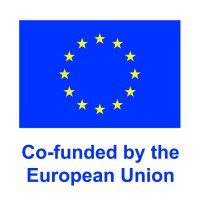 ‚Äč‚Äč‚Äč‚Äč‚Äč‚Äč‚Äč
‚Äč‚Äč‚Äč‚Äč‚Äč‚Äč‚Äč



